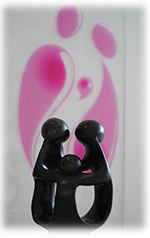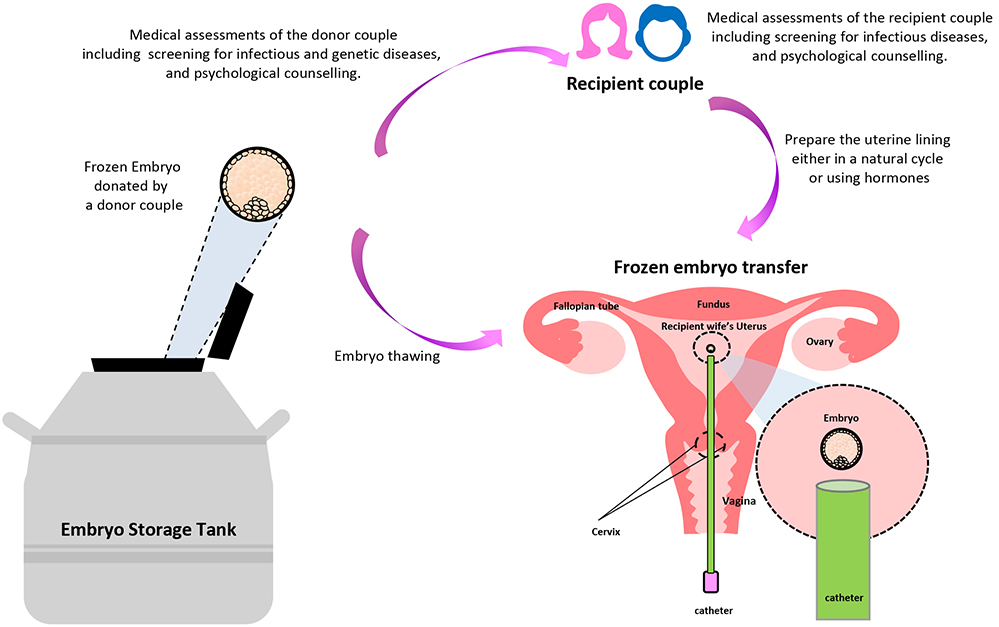Embryo Donation
What is embryo donation?
Embryo donation is when a couple (a donor couple) donate their embryos created through the process of In-vitro Fertilization (IVF) to another couple (a recipient couple). The donor couple went through IVF treatment initially for treatment of their own infertility. After they have completed their family, if they still have embryos left behind, they may wish to donate their embryos to a recipient couple. The donated embryos are transferred into the recipient wife’s womb to help her conceive.

Who needs to consider embryo donation?
There are many reasons why a couple might not be able to use their own eggs and sperm to conceive. The cause may be related to the wife, or the husband, or a combination of both. Couples can consider egg donation if the problem lies with the wife; or sperm donation if the problem lies with the husband; or embryo donation as an alternative. If both parties are involved, they can also consider embryo donation.
Couples with the following conditions may have to consider embryo donation:
-
The wife has Low Ovarian Reserve or Ovarian Failure, as a result of previous chemotherapy, radiotherapy, ovarian surgery, advanced reproductive age, genetic cause or unknown cause. Women with low ovarian reserve have very small number of eggs that are usually of poor quality, resulting in IVF treatment failure. Needless to say, women who have ovarian failure cannot produce eggs at all and thus can consider embryo donation.
-
The wife has Poor Egg Quality, as a result of low ovarian reserve, advanced reproductive age or unknown cause. These women may have undergone IVF treatments and were found to have poor egg quality, thus leading to IVF treatment failure.
-
The husband has Azoospermia, due to obstructive or non-obstructive causes. Men with azoospermia can undergo Surgical Sperm Retrieval to collect sperm for use in IVF treatment. Alternatively, he can choose to receive donated embryos to help his wife conceive. Azoospermic men who have failed to retrieve sperm from a surgical sperm retrieval procedure can also consider embryo donation.
-
Either one or both of the couple has a Known Hereditary Disease, such as a chromosomal rearrangement or a monogenic disease. Individuals with these conditions may pass the genetic abnormality to their children. They can have the option of undergoing IVF and Pre-implantation Genetic Testing (PGT) to select embryos not affected by the disease for transfer. Alternatively, they can choose to use embryos from a donor couple who do not carry the condition so as to avoid the risk of having a child with the disease.
Is embryo donation legal in Hong Kong?
Yes, embryo donation is legal in Hong Kong. Like donating blood, kidney, heart and other organs, donating embryos is a gift, a voluntary act of kindness. It is ILLEGAL to buy or sell embryos in Hong Kong. A recipient couple cannot reward the donor couple for the supply of their embryos.
Where do these donated embryos come from?
Donated embryos are created during the process of IVF. Some couples went through IVF treatment in Hong Kong Assisted Reproductive Centre for treatment of their own infertility. After they have completed their family and still have embryos left behind, they may wish to donate these embryos to other couples with infertility to help them conceive. These embryos are donated anonymously to the Centre.
Who are eligible to be embryo donors?
To be eligible as embryo donors, the donor wife and husband should be between 18 to 34 years and 18 to 54 years of age respectively at the time when the embryos were created. Both of them should be in good health and without any personal or family history of hereditary disease or abnormal baby. In addition, if the donor couple have donated their embryos to other couples, their donation should not have resulted in more than 3 live birth events in Hong Kong.
What steps does a potential donor couple have to go through before they can donate their embryos?
The potential donor wife has go through the following medical assessments:
-
A general body examination to make sure that she is healthy;
-
Blood tests including CBP and MCV, blood and Rhesus groups, and Pap smear test if appropriate;
-
Blood tests to exclude certain infectious diseases including Hepatitis B, Hepatitis C, Syphilis, HIV and Cytomegalovirus (CMV);
-
Vaginal swabs to exclude Gonorrhoea and Chlamydia infections;
-
Blood tests for Expanded Carrier Screening (ECS) and chromosome check (karyotyping) to screen for genetic diseases.
The potential donor husband has go through the following medical assessments:
-
A general body examination to make sure that he is healthy;
-
Blood tests for CBP and MCV, blood and Rhesus groups;
-
Blood tests to exclude certain infectious diseases including Hepatitis B, Hepatitis C, Syphilis, HIV and Cytomegalovirus (CMV);
-
Urine tests to exclude Gonorrhoea and Chlamydia infections;
-
Blood tests for Expanded Carrier Screening (ECS) and chromosome check (karyotyping) to screen for genetic diseases.
However, infectious diseases and genetic diseases cannot be totally excluded by these investigations. Therefore, recipient couples need to be fully aware of this limitation before accepting embryo donation.
After passing the medical assessments, the potential donor couple have to meet a counsellor who will discuss with them the social and psychological implications of embryo donation. When they are fully informed and are comfortable about donating their embryos, they can then sign the consent forms.
What steps does a potential recipient couple have to go through before they can receive embryo donation?
A potential recipient couple have to undergo screening tests to enable a safe and appropriate match with the donor and to ensure the recipient wife’s safe passage through the treatment. The recipient couple have to be assessed by a counsellor to make sure they understand the implications of the embryo donation process.
The recipient wife has to go through the following medical assessments:
-
A general body examination including a transvaginal pelvic ultrasound scan to make sure that she is healthy;
-
Blood tests including CBP and MCV, blood and Rhesus groups, and Pap smear test if appropriate;
-
Blood tests to exclude certain infectious diseases including Hepatitis B, Hepatitis C, Syphilis, HIV and Cytomegalovirus (CMV);
-
Vaginal swabs to exclude Gonorrhoea and Chlamydia infections;
-
A blood test to confirm Rubella immunity.
The recipient husband has to go through the following medical assessments:
-
Blood tests for CBP and MCV, blood and Rhesus groups;
-
Blood tests to exclude certain infectious diseases including Hepatitis B, Hepatitis C, Syphilis and HIV.
Embryo Donation Flowchart

 scroll right to see more
scroll right to see more
How long does it take before starting the treatment?
Not many couples are willing to donate embryos. Therefore, it is very difficult to predict the waiting time for a suitable donor couple to come by. Once a donor couple have donated their embryos to the Centre, our donation co-ordinator will match the donor characteristics with any potential recipient couples in the waiting list. The potential recipient couple will be informed, and have to go through the medical assessments and counselling. When the couple feel comfortable with the donation process, then embryo transfer can be arranged.